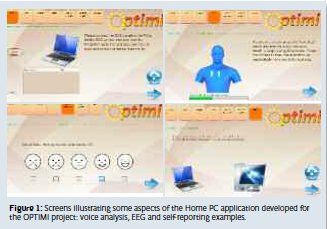By Mariano Alcañiz et al.
Currently, depression and stress-related disorders are the most common mental illnesses and the prevention of depression and suicide is one of the five key points in the European Pact on Mental Health and wellbeing. Furthermore, depression is the leading cause of disability and the fourth leading contributor to the global burden of disease. Depression and suicide are major public health challenges, with roots across all sectors of society. Depression is very prevalent, affecting 13% of Europeans during their lifetime, with high levels of suffering for individuals and families, as well as high costs due to loss of productivity and healthcare. Depression reduces productivity due to increases in sick leaves and disability pensions.
OPTIMI is a European Project funded by the European Union’s 7th Framework Programme Personal Health Systems – Mental Health – Collaborative Project. The coordination of the program is led by Everis Spain SL and the OPTIMI web page is: http://optimiproject.eu/
OPTIMI tries to determine the continuous effect of stress on the individual by studying patterns of behavior over a longer period in order to predict whether the user is at risk for depression. If so, it will be able to provide an intervention program to reduce stress levels and the consequent risk of depression.
The OPTIMI project is based on Personal Health Systems (PHS), a new and fast growing concept that has become more widely used over the past few years. The concept focuses on the individualization of prevention, treatment and wellbeing procedures for patients available through the healthcare system. In general, PHS are expected to contribute to the following major needs: (a) The need for ubiquitous, unobtrusive, pervasive bio-data acquisition, processing, management and use for medical decision support, (b) The need for the combination of multilevel medical/psychological information as well as environmental information in order to promote the individualization of healthcare, (c) The need to increase the quality of health care delivery through rigorous biofeedback mechanisms and thus, improve patient safety.
Moreover, PHS assist people in the provision of continuous, quality controlled, and personalized health services to empower individuals regardless of location. They can consist of: a) Ambient and/or body devices (wearable, portable or implantable), which acquire, monitor and communicate physiological parameters and other health-related factors of an individual (e.g., vital body signs, biochemical markers, activity, emotional and social state, environment); b) Intelligent processing of the acquired information and coupling of it with expert biomedical knowledge to derive important new insights about an individual’s health status; c) Active feedback based on such new insights, either from health professionals or directly from the devices to the individuals, assisting in diagnosis, treatment and rehabilitation, as well as in disease prevention and lifestyle management.
All these features are applicable to the OPTIMI project. There is also a growing trend in psychological research to use ecological momentary assessments (EMA) that can prompt the subjects on a periodic basis to rate and give answers concerning different parameters. This approach is followed by OPTIMI since various measurements are consistently monitored.
Currently, we have pharmacology and evidence- based psychological treatments (EBT) for depression and stress-related disorders. Nevertheless, we have to point out that less than 50% of patients receive adequate treatment. The main reasons are cost and the time required for treatment, the lack of wellprepared professionals, the fact that many patients do not decide to seek help, and the provision of mental healthcare is generally less than adequate in terms of accessibility and quality. Regarding these worrying factors, the OPTIMI project is born with the aim to develop new strategies to help those people affected by depression and stress, and more importantly, given the near exponential increment in the number of sufferers, to try to develop better tools for the identification of subjects that are at risk in order to design effective preventive programs.
Goals of OPTIMI
OPTIMI approach: an important issue in the onset of depression and stress-related disorders is the individual’s ability to cope with stress on a psychological and a physiological level. Some individuals are extremely resilient, but others find it difficult to cope. OPTIMI will thus attempt to predict the onset of illness by monitoring mood states, coping behavior and changes in stress-related physiological variables (e.g. heart rate, cortisol, sleep, etc.).
Based on these premises, OPTIMI has been created with two goals in mind: first, the development of new tools to monitor coping behavior in individuals exposed to high levels of stress; second, the development of online interventions to improve this behavior and reduce the incidence of depression. The emphasis in this project is to develop tools that will lead to prevention and identification of illness in support of CBT and CCBT treatments. In other words, OPTIMI is focused on the prediction and prevention of depression.
OPTIMI Trials
To achieve its first goal, OPTIMI will develop technology-based tools to monitor the physiological state and the cognitive, motor and verbal behavior of high-risk individuals over an extended period of time and to detect changes associated with stress, poor coping skills and depression.
A series of “calibration trials” will allow the project to test a broad range of technologies. These will include wearable EEG and ECG sensors to detect subjects’ physiological and cognitive state, accelerometers to characterize their physical activity, and voice analysis to detect signs of depression. These automated measurements will be complemented with electronic diaries, in which subjects report their own behaviors and the stressful situations to which they are exposed. All participants will be regularly assessed by a psychologist who will use standardized instruments to detect stress, poor coping skills and depression. A few will also be asked to wear implanted devices to test levels of cortisol in the blood, an objective physiological correlate of stress. The project will use machine learning to identify patterns in the behavioral and physiological data that predict findings from the psychologist and the cortisol measurements.
To achieve its second goal, OPTIMI will adapt two existing systems already used to provide online CBT treatment for mental disorders. The project tests the treatment systems in “intervention trials” targeting individuals at high risk of exposure to chronic or acute stress. Examples include persons with personal responsibility for the long term care of elderly or disabled patients, individuals (especially unemployed individuals) in situations of acute financial stress, and students preparing for important examinations.
OPTIMI Contributions
The final OPTIMI monitoring system will consist of the subset of tools that proves useful for the detection of significant changes and are acceptable to users, taking into account ergonomics and usability. OPTIMI’s tools are meant to obtain relevant information in a constant and systematic way, and apart from providing consistent feedback to the users about their current situation regarding coping, mood, and stress, the feedback provided by the system is one of the core aspects in the management and prevention of depressive symptoms.
In a preventative role, OPTIMI tools, combined with CBT techniques, provide feedback to the user when the system can detect a combination of stress and a period of negative behavioral response. On-going monitoring with the OPTIMI tools will make it possible to assess the effectiveness of treatment and to optimize the treatment cycle.
Mariano Alcañiz , Ph.D. Irene Zaragozá, MSc Beatriz Rey, Ph.D. Universidad Politécnica de Valencia
Cristina Botella, Ph.D. Inés Moragrega, Ph.D. Universitat Jaume I
Rosa Baños, Ph.D. Universitat de Valencia Spain malcaniz@labhuman.i3bh.es
About Brenda Wiederhold
President of Virtual Reality Medical Institute (VRMI) in Brussels, Belgium.
Executive VP Virtual Reality Medical Center (VRMC), based in San Diego and Los Angeles, California.
CEO of Interactive Media Institute a 501c3 non-profit
Clinical Instructor in Department of Psychiatry at UCSD
Founder of CyberPsychology, CyberTherapy, & Social Networking Conference
Visiting Professor at Catholic University Milan.







